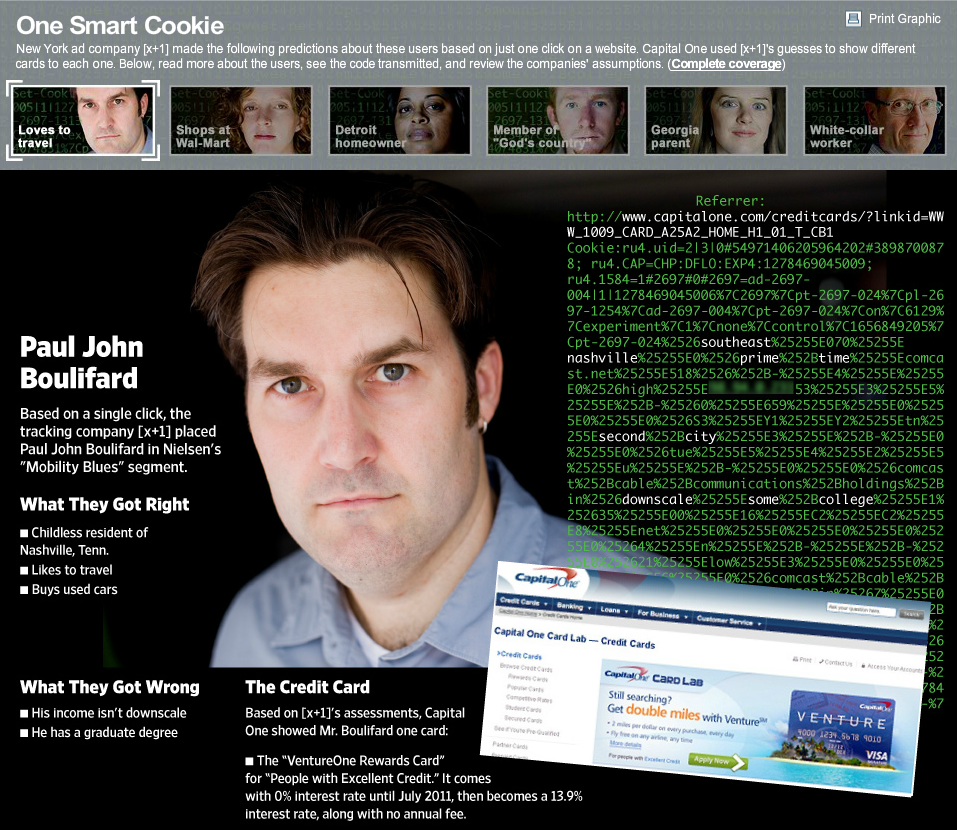Companies are developing digital fingerprint technology to identify how we use our computers, mobile devices and TV set-top boxes. WSJ’s Simon Constable talks to Julia Angwin about the next generation of tracking tools.
Race Is On to ‘Fingerprint’ Phones, PCs
The Wall Street Journal, Page One

BlueCava CEO David Norris plans to fingerprint billions of devices. Tracking cookies ‘are a joke,’ he says.
He’s off to a good start. So far, Mr. Norris’s start-up company, BlueCava Inc., has identified 200 million devices. By the end of next year, BlueCava says it expects to have cataloged one billion of the world’s estimated 10 billion devices.
Advertisers no longer want to just buy ads. They want to buy access to specific people. So, Mr. Norris is building a “credit bureau for devices” in which every computer or cellphone will have a “reputation” based on its user’s online behavior, shopping habits and demographics. He plans to sell this information to advertisers willing to pay top dollar for granular data about people’s interests and activities.
Read more at The Wall Street Journal and see the full What They Know series online.
‘Scrapers’ Dig Deep for Data on Web
The Wall Street Journal, Page One
At 1 a.m. on May 7, the website PatientsLikeMe.com noticed suspicious activity on its “Mood” discussion board. There, people exchange highly personal stories about their emotional disorders, ranging from bipolar disease to a desire to cut themselves.
It was a break-in. A new member of the site, using sophisticated software, was “scraping,” or copying, every single message off PatientsLikeMe’s private online forums.
Read more at The Wall Street Journal and see the full What They Know series online.
One Smart Cookie
New York ad company [x+1] made predictions about users based on just one click on a website. This interactive shows the company’s assumptions about users and how they affected what credit cards were shown.
Read more at The Wall Street Journal and see the full What They Know series online.
On the Web’s Cutting Edge, Anonymity in Name Only
The Wall Street Journal, Page One
You may not know a company called [x+1] Inc., but it may well know a lot about you.
From a single click on a web site, [x+1] correctly identified Carrie Isaac as a young Colorado Springs parent who lives on about $50,000 a year, shops at Wal-Mart and rents kids’ videos. The company deduced that Paul Boulifard, a Nashville architect, is childless, likes to travel and buys used cars. And [x+1] determined that Thomas Burney, a Colorado building contractor, is a skier with a college degree and looks like he has good credit.
The company didn’t get every detail correct. But its ability to make snap assessments of individuals is accurate enough that Capital One Financial Corp. uses [x+1]’s calculations to instantly decide which credit cards to show first-time visitors to its website.
Read more at The Wall Street Journal and see the full What They Know series online.
Sites Feed Personal Details to New Tracking Industry
The Wall Street Journal, Page A1
The largest U.S. websites are installing new and intrusive consumer-tracking technologies on the computers of people visiting their sites—in some cases, more than 100 tracking tools at a time—a Wall Street Journal investigation has found.
The tracking files represent the leading edge of a lightly regulated, emerging industry of data-gatherers who are in effect establishing a new business model for the Internet: one based on intensive surveillance of people to sell data about, and predictions of, their interests and activities, in real time.
Read more at The Wall Street Journal. See the interactive database accompanying the article and see the full What They Know series online.
The Web’s New Gold Mine: Your Secrets
A Journal investigation finds that one of the fastest-growing businesses on the Internet is the business of spying on consumers. First in a series.
The Wall Street Journal, Page W1

Ashley Hayes-Beaty
Hidden inside Ashley Hayes-Beaty’s computer, a tiny file helps gather personal details about her, all to be put up for sale for a tenth of a penny.
The file consists of a single code— 4c812db292272995-e5416a323e79bd37—that secretly identifies her as a 26-year-old female in Nashville, Tenn. The code knows that her favorite movies include “The Princess Bride,” “50 First Dates” and “10 Things I Hate About You.” It knows she enjoys the “Sex and the City” series. It knows she browses entertainment news and likes to take quizzes.
Read more at The Wall Street Journal and see the full What They Know series online.
Who Owns Your Name on Twitter?
The Wall Street Journal, The Decoder column
Social networks can be friendly places, but they are not democracies. Nor are they free markets. They are authoritarian regimes with whimsical and arbitrary rules.
Read more at The Wall Street Journal.
Facebook: Can It Be Tamed?
The Wall Street Journal, The Decoder column
My Facebook account is becoming unmanageable. It’s filled with updates, notifications, messages, wall postings, pokes, notes, friend requests and group requests (and that’s just a small sampling of it all). My Facebook correspondents range from professional contacts, to friends and family, to people I don’t really know at all.
Read more at The Wall Street Journal.
Recipe for a Successful Viral Video Campaign
The Wall Street Journal, The Decoder column
When Judson Laipply posted his six-minute “Evolution of Dance” video to YouTube in April of 2006, he didn’t advertise it at all. One month later, someone noticed his frenzied moves and e-mailed it to a friend. That friend e-mailed to other friends and more than 100 million views later, the rest is history. “It was all just pure luck” Mr. Laipply says.
Read more at The Wall Street Journal.


